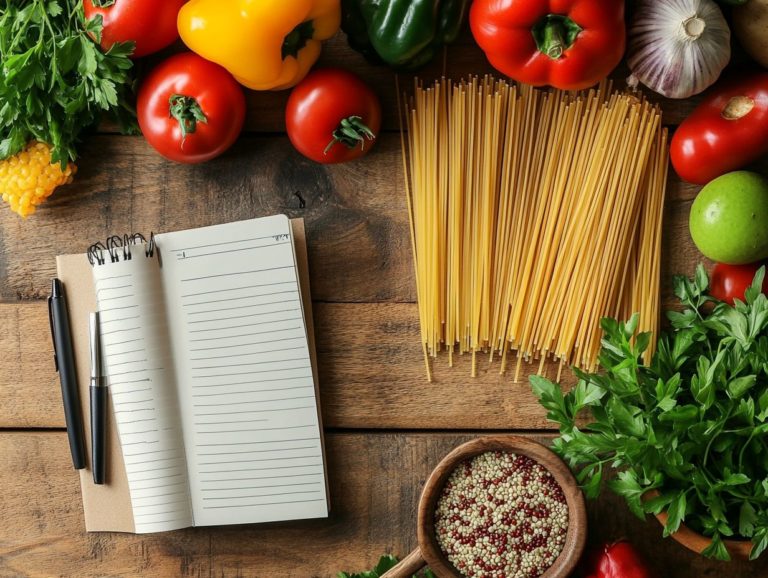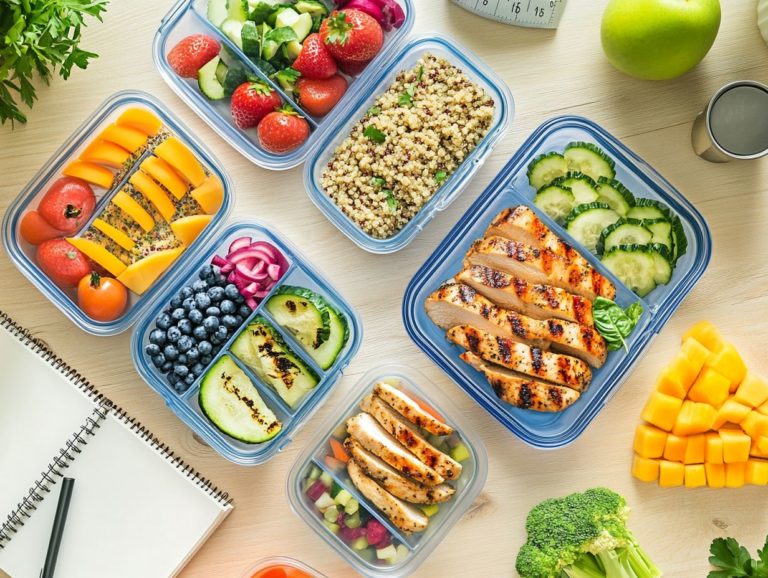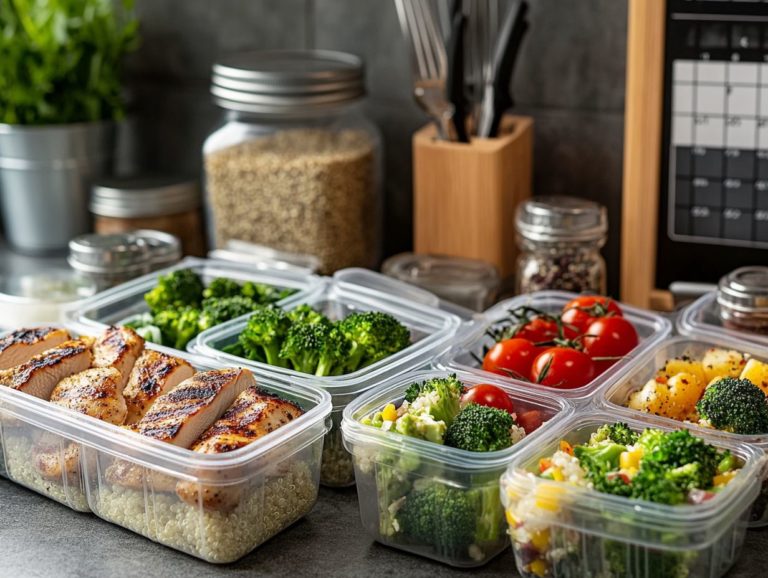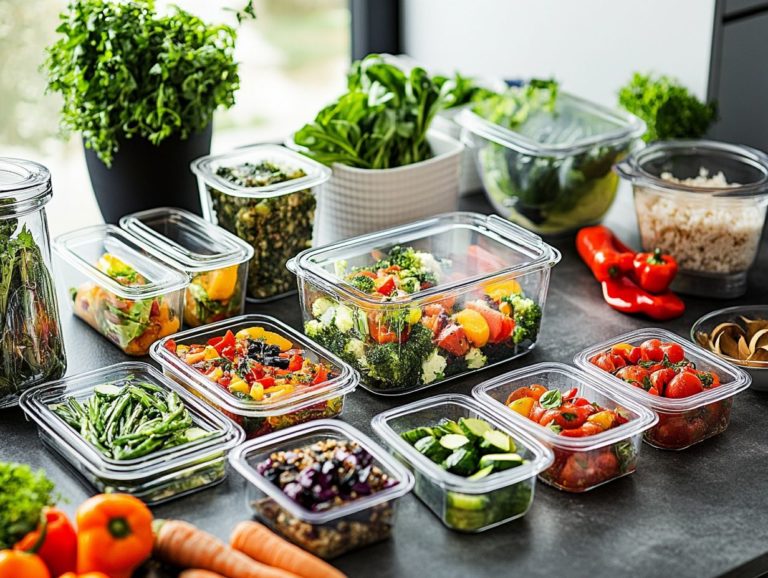Meal Planning for Beginners: Getting Started
Meal planning might feel overwhelming at first, but it s an incredibly effective way to streamline your week and foster healthier eating habits.
In this guide, you’ll discover what meal planning truly entails and the numerous benefits it can bring. You ll learn how to evaluate your dietary needs, craft a thoughtful grocery list, and explore strategies like batch cooking and innovative ways to utilize leftovers.
You will also find tips for keeping your meal plans organized and flexible, all while ensuring variety and a balance of nutrients.
Prepare to elevate your mealtime experience!
Contents
- Key Takeaways:
- Understanding the Basics of Meal Planning
- Getting Started with Meal Planning
- Meal Planning Strategies
- Tips for Successful Meal Planning
- Frequently Asked Questions
- What is meal planning for beginners and why is it important?
- How do I get started with meal planning as a beginner?
- What are some tips for creating a meal plan as a beginner?
- How can I make meal planning more affordable?
- What are some common mistakes beginners make when meal planning?
- How can I make meal planning part of my routine as a beginner?
Key Takeaways:
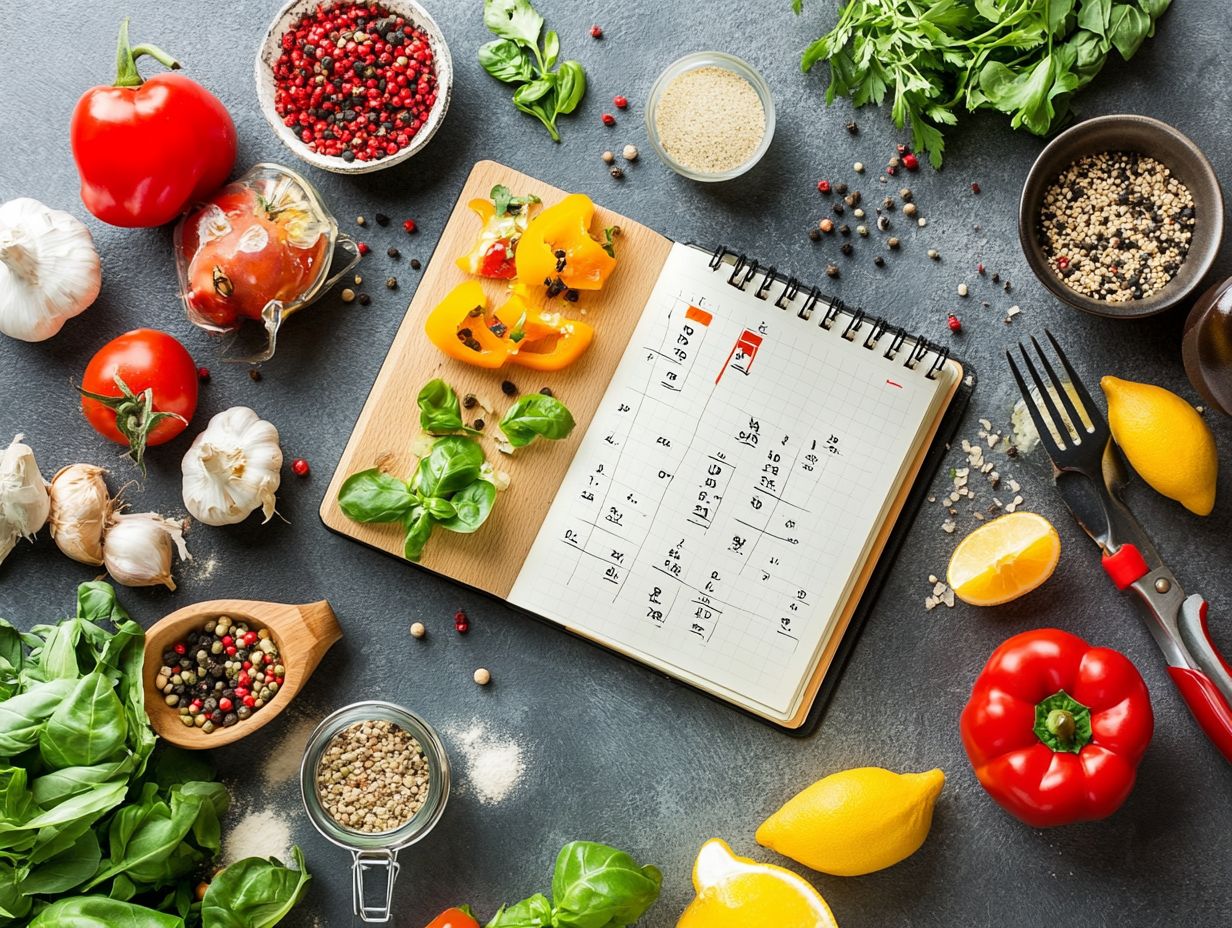
- Start meal planning by understanding the basics, such as what it is and its benefits. This will help you stay organized and save time and money in the long run.
- Get started by assessing your dietary needs and preferences and creating a grocery list. This ensures that you have the necessary ingredients for your meals and avoid food waste.
- Utilize meal planning strategies such as batch cooking, meal prepping, and using leftovers creatively to save time and add variety to your meals. Stay flexible and incorporate nutrient balance to make meal planning a successful and enjoyable experience.
Understanding the Basics of Meal Planning
Grasping the fundamentals of meal planning is crucial for anyone eager to simplify their cooking routine and adopt healthier eating habits. Not only does meal planning save you time, but it also minimizes food waste and ensures you meet your nutritional needs.
By organizing your grocery list and meal prep, you can craft a weekly routine that fits seamlessly into your busy lifestyle, transforming cooking into a more pleasurable experience. This essential knowledge can significantly elevate your cooking efficiency, leading to a delightful variety of meals tailored to your tastes.
What is Meal Planning?
Take control of your meals with meal planning! It involves selecting recipes that meet your dietary needs and preferences, organizing your ingredients, and even preparing some meals ahead of time.
Essentially, it s a thoughtful approach to cooking that simplifies the process while ensuring you maintain a balanced diet. By considering the nutrients your body needs, you can tailor your meal choices to embrace a variety of food groups, promoting better health.
Meal planning also invites you to get creative with your recipe selection, encouraging you to explore diverse cuisines and seasonal ingredients. Implementing strategies for meal planning for picky eaters can help you resist the lure of last-minute unhealthy options and simplify grocery shopping, ensuring you always have the necessary items on hand for each dish.
It s an invaluable tool for anyone wishing to elevate their culinary experience while meeting their nutritional needs.
Benefits of Meal Planning
The benefits of meal planning are numerous, impacting areas such as time management, effective budgeting, and fostering healthy eating habits. By embracing meal planning, you can optimize your grocery shopping and cooking efficiency, ultimately reducing stress while enhancing your nutrition.
If you dedicate just a few hours each week to plan your meals, you could save up to 10 hours of cooking time. That’s time you could use for hobbies or family fun!
Meal planning also gives you the power to adhere to your grocery budget, often leading to savings of up to 25% on food costs. This is largely thanks to less impulsive buying and more deliberate choices that align with your actual needs.
Moreover, those who consistently plan their meals are more inclined to incorporate a wider variety of fruits and vegetables into their diets. Research suggests that meal planners consume 5 to 10 more servings of produce each week compared to those who don t engage in planning.
In essence, the practice of meal planning encompasses not only convenience but also significant financial and health benefits.
Start your meal planning journey today and discover how easy and enjoyable healthy eating can be!
Getting Started with Meal Planning
To embark on your meal planning journey, follow several essential steps. Begin by assessing your dietary needs, then craft a grocery list that reflects those considerations. For more detailed strategies, check out this meal planning guide for busy weeknights.
Utilizing meal planning templates can significantly streamline your process, making it more efficient and enjoyable. Before you head out shopping, don t forget to conduct a thorough pantry check. This ensures you have the necessary ingredients on hand and sparks meal ideas that align perfectly with your nutritional goals.
Assessing Dietary Needs and Preferences
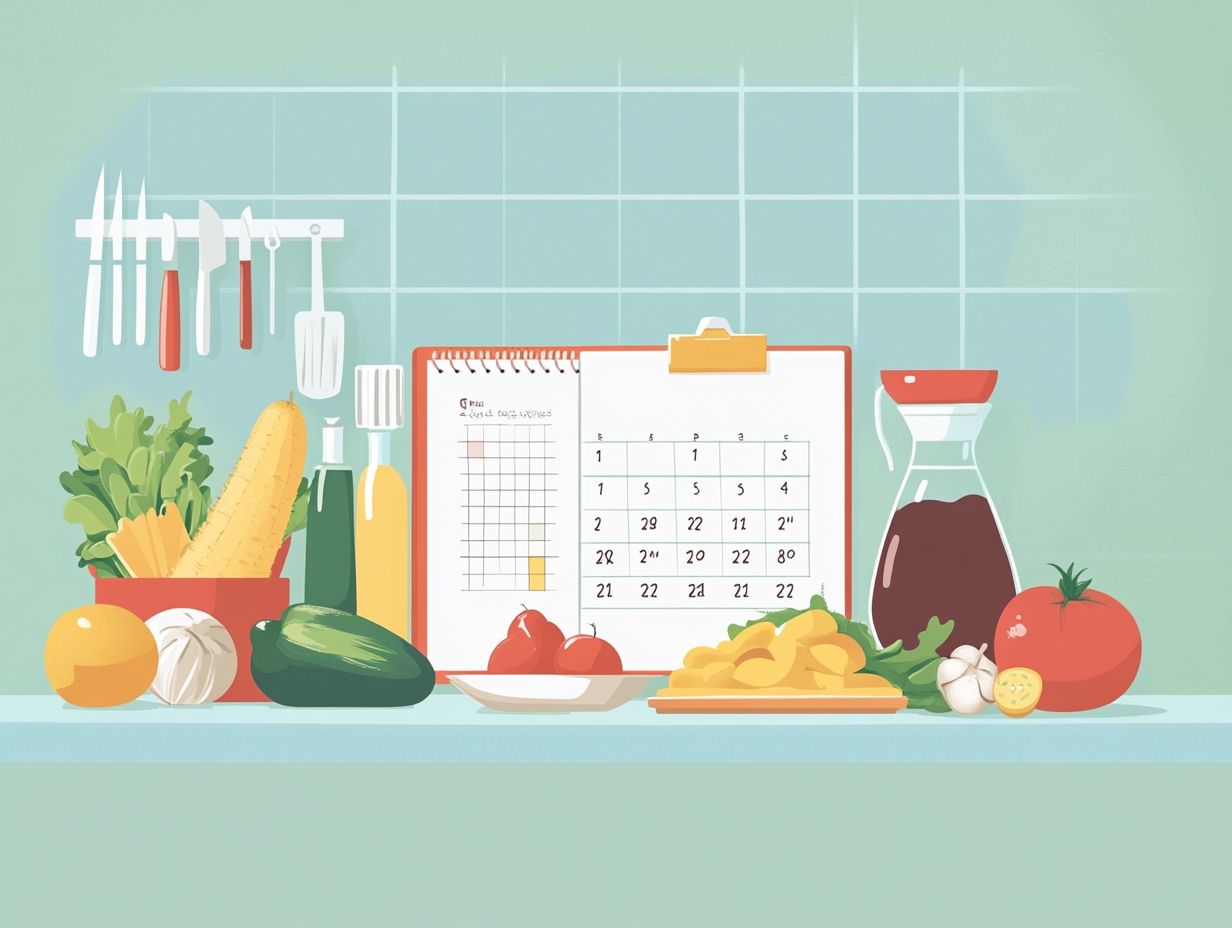
Assessing your dietary needs and preferences is an essential first step in effective meal planning. This approach allows you to tailor your meal choices to align with your unique nutritional requirements and lifestyle. Whether you’re looking for low-calorie options, high-protein meals, or recipes accommodating specific dietary restrictions, understanding your needs is key to the planning process.
An individualized assessment considers various factors, including potential food allergies and specific calories you need based on your age and how active you are. Personal preferences are equally important, as they significantly impact the enjoyment and sustainability of your meal plan.
By thoughtfully evaluating these elements, you can create a diverse menu that meets nutritional standards and delights your taste buds. This meticulous process shapes your shopping lists and cooking methods, ensuring that the meals you prepare are satisfying and align with your dietary goals.
Creating a Grocery List
Creating a grocery list is a crucial part of your meal prep routine, helping you stay organized and focused while shopping and keeping your budget in check. A thoughtfully structured grocery list ensures you purchase the necessary ingredients and streamlines ingredient organization for efficient cooking.
This practice is especially valuable when you want to stick to a budget, guiding you toward buying only what you truly need, ultimately reducing food waste and those pesky impulse purchases.
One effective strategy to elevate your list-making is to categorize items according to the store’s layout think produce, dairy, and grains making your shopping experience quicker and more streamlined. Incorporating seasonal ingredients not only helps you save money but also enhances the quality of your meals. For instance, noting what s on sale or planning your meals around these seasonal gems sparks both creativity and resourcefulness in your meal preparation.
Meal Planning Strategies
Meal planning strategies are critical for anyone eager to elevate their cooking game and guarantee a consistent flow of nutritious meals. By adopting techniques like meal prepping, batch cooking, and maximizing ingredient efficiency, you can save time and enrich the diversity of your meals.
Batch Cooking and Meal Prepping
Batch cooking and meal prepping are your keys to unlocking convenience in the kitchen! By preparing large quantities of meals ahead of time for those busy weeks, you save time and maximize the use of frozen foods and leftovers for future meals.
By dedicating just a few hours each week to cooking, you can whip up a diverse array of dishes that cater to everyone’s tastes and dietary needs. Techniques like roasting, steaming, and slow cooking not only enhance flavor but also promote nutrition.
Organizing your meals into portioned containers streamlines your week, making it effortless to grab a wholesome lunch or dinner on the go. Ultimately, these practices alleviate the stress of daily cooking, encourage healthier eating habits, and reduce food waste all contributing to a more balanced and fulfilling lifestyle.
Using Leftovers Creatively
Using leftovers creatively can make meal planning more fun and effective. It transforms potential food waste into a canvas for delicious new culinary creations. By focusing on meal customization and proper food storage, you can ensure that leftovers become a staple in your weekly menu rather than an afterthought.
This approach cuts down on waste and sparks your creativity in the kitchen! Picture transforming yesterday’s roasted chicken into zesty enchiladas or a satisfying stir-fry, introducing an impressive array of flavors to your family s dining experience.
By optimizing your food storage, you maintain the freshness and flavor of your ingredients, making it easy to access prepped items whenever you need them. For example, repurposing steamed vegetables into a vibrant soup can breathe new life into what’s familiar.
Highlighting ingredient utilization not only sparks inspiration but also makes meal prep a delightful and rewarding activity that everyone can enjoy.
Tips for Successful Meal Planning
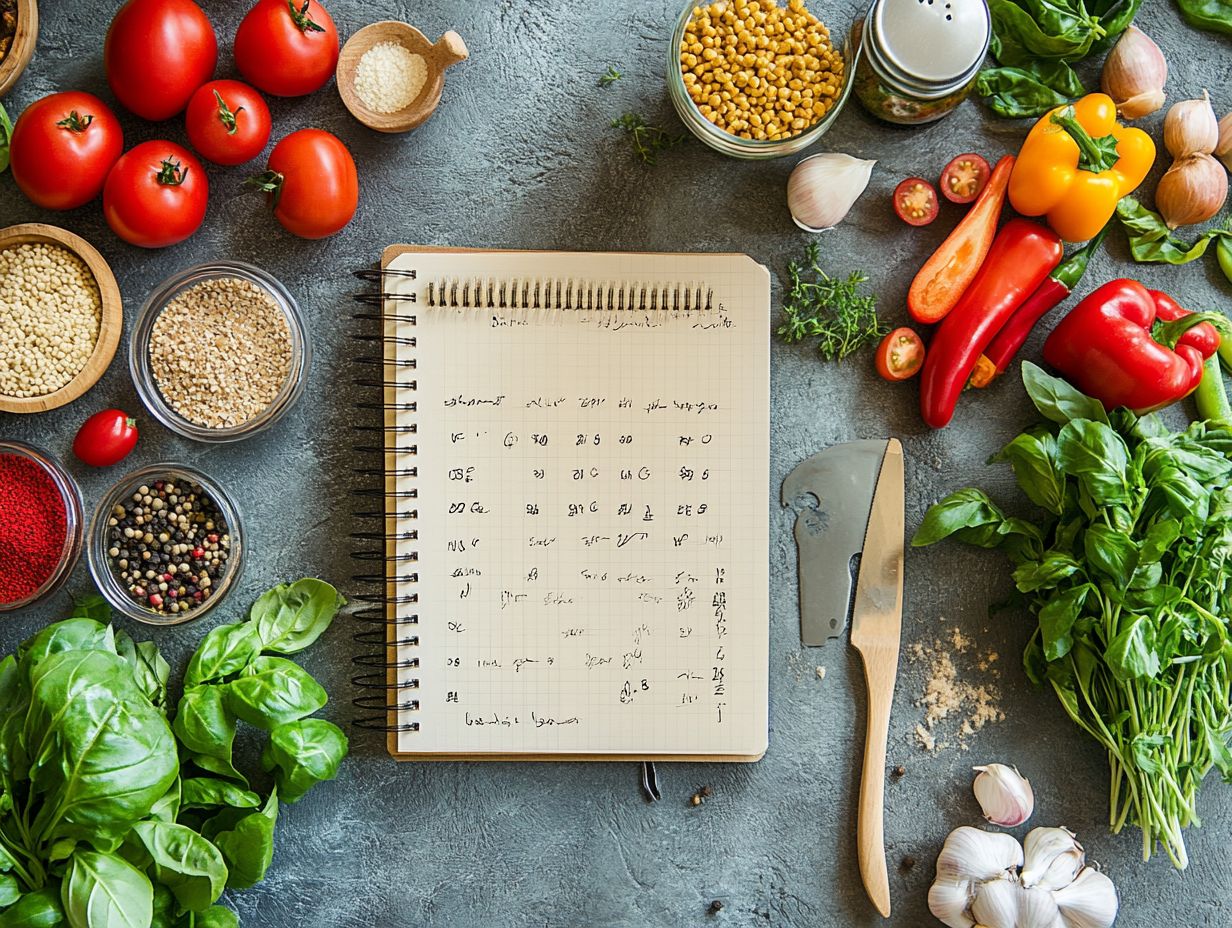
Successful meal planning demands a harmonious blend of effective strategies, insightful cooking tips, and a steadfast commitment to achieving your goals, including meal planning for a vegan lifestyle.
Honing your time management skills helps you establish a sustainable meal planning routine that elevates your entire cooking experience. Start planning your meals today for a happier kitchen tomorrow!
Staying Organized and Flexible
Staying organized and flexible is essential for maintaining an effective meal planning process, especially when your schedule gets busy. By establishing efficient systems and adapting to changes, you can ensure that your cooking remains enjoyable and stress-free.
One practical strategy is to create a weekly meal calendar, planning meals around the ingredients you already have at home. This not only reduces food waste but also saves you money.
Consider utilizing technology, such as meal planning apps, to help you track grocery lists and schedules. This allows for easy modifications as new cravings pop up.
Exploring batch cooking techniques preparing multiple meals at once can significantly enhance your efficiency. It s a true lifesaver during hectic weeks.
And remember, being open to swapping meals throughout the week can relieve the pressure of sticking rigidly to a plan, transforming mealtimes from a chore into a delightful experience.
Incorporating Variety and Nutrient Balance
Incorporating variety and nutrient balance into your meal planning is vital for promoting healthy eating while keeping your culinary adventures exciting. By exploring different cooking methods and seeking out meal inspiration, you can craft a diverse menu that caters to your nutritional needs.
One delightful way to maintain interest is by experimenting with global cuisines, which often showcase unique ingredients and flavors. Imagine indulging in a Mediterranean grain bowl brimming with quinoa, chickpeas, and vibrant vegetables, all drizzled with a zesty dressing.
Varying your cooking techniques like grilling, roasting, and steaming can enhance textures and preserve nutrients. This makes your meals both enjoyable and wholesome. Consider introducing themed nights, such as Taco Tuesday or Stir-Fry Saturday, to spark your creativity in the kitchen.
Don t forget to incorporate seasonal produce to ensure freshness and variety. And why not utilize herbs and spices to elevate each dish? They not only add flavor but also provide essential vitamins and antioxidants, transforming your meals into nourishing experiences.
Frequently Asked Questions
What is meal planning for beginners and why is it important?
Meal planning is about organizing your meals ahead of time. It involves creating a weekly or monthly meal plan, grocery shopping, and prepping ingredients. It is important because it saves time, money, and promotes healthier eating habits.
How do I get started with meal planning as a beginner?
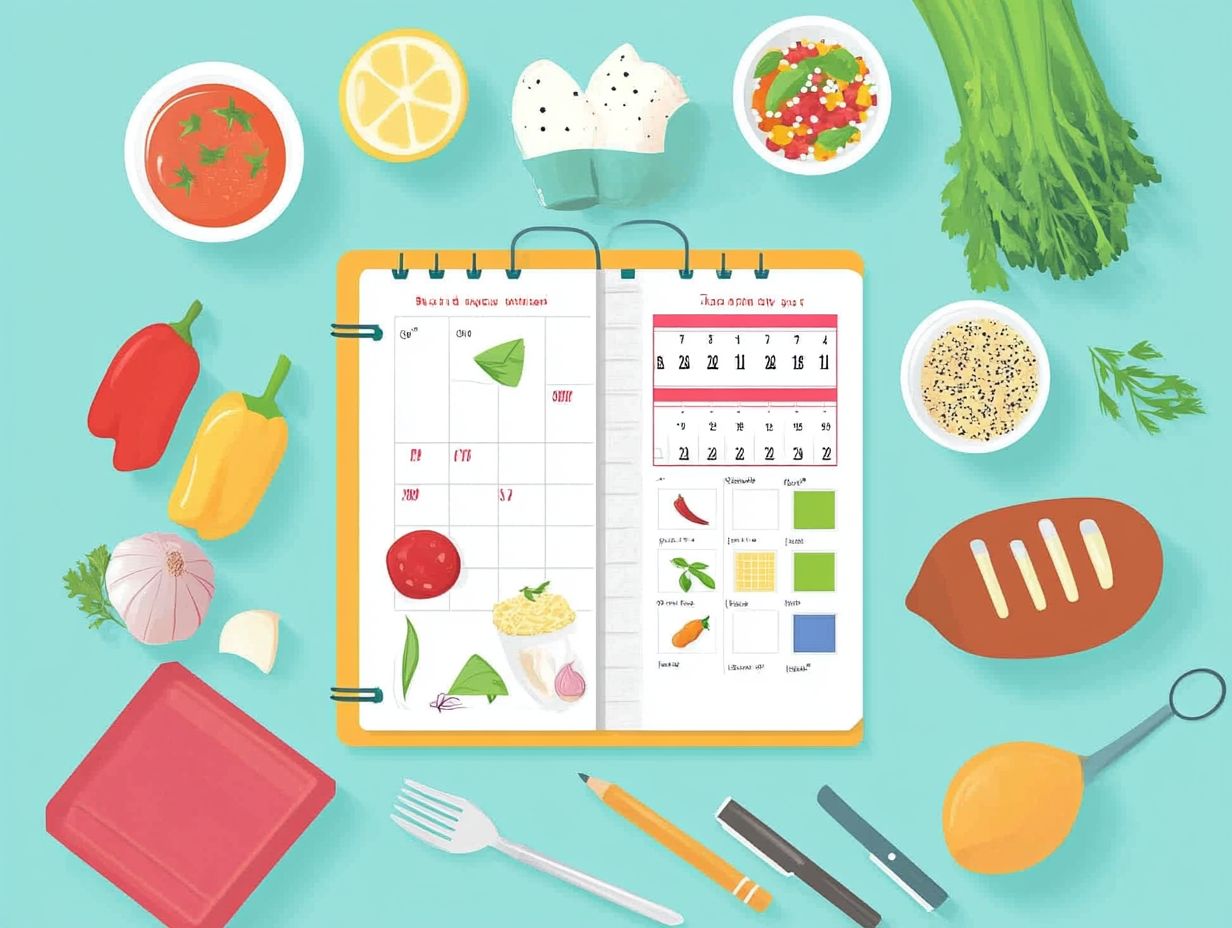
Start by setting a clear goal for your meal planning. Whether you want to save money, eat healthier, or save time, knowing your goal helps you stay focused. For those looking to eat healthier, consider exploring meal planning for vegetarians to make more informed choices.
Choose a specific day of the week for planning and preparing meals. Begin with planning for just a few days, and gradually work up to a full week using meal planning for healthy eating on a budget.
Finally, create a grocery list based on your meal plan and stick to it.
What are some tips for creating a meal plan as a beginner?
First, check your schedule and choose meals that fit into your daily routine. Think about batch cooking or using leftovers to save time and money.
Don’t hesitate to try new recipes. Flexibility is key, so adjust your meal plans as needed!
How can I make meal planning more affordable?
You can save money by using seasonal ingredients, buying in bulk, and planning meals around sales and coupons. Add more plant-based meals and use affordable proteins like beans and lentils to cut costs.
What are some common mistakes beginners make when meal planning?
A big mistake is not paying attention to portion sizes, leading to too much or too little food. Be realistic about your time constraints; planning complex meals can be overwhelming.
It’s also crucial to stay flexible. Don’t be too strict with your meal plan!
How can I make meal planning part of my routine as a beginner?
Set aside a specific time each week for planning and preparing meals. Utilize a meal planning app or template to simplify the process.
Involve your family or roommates by asking for their input. With practice, meal planning will become a natural part of your week!

